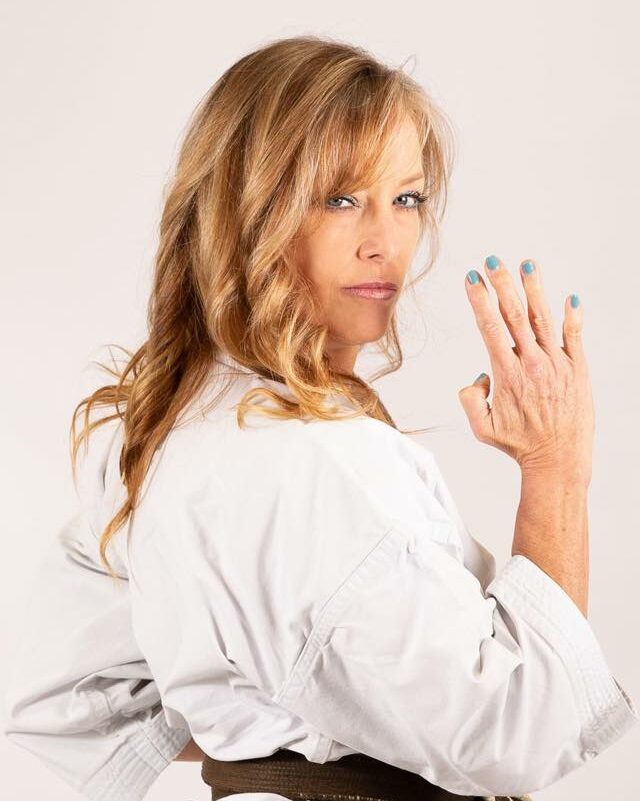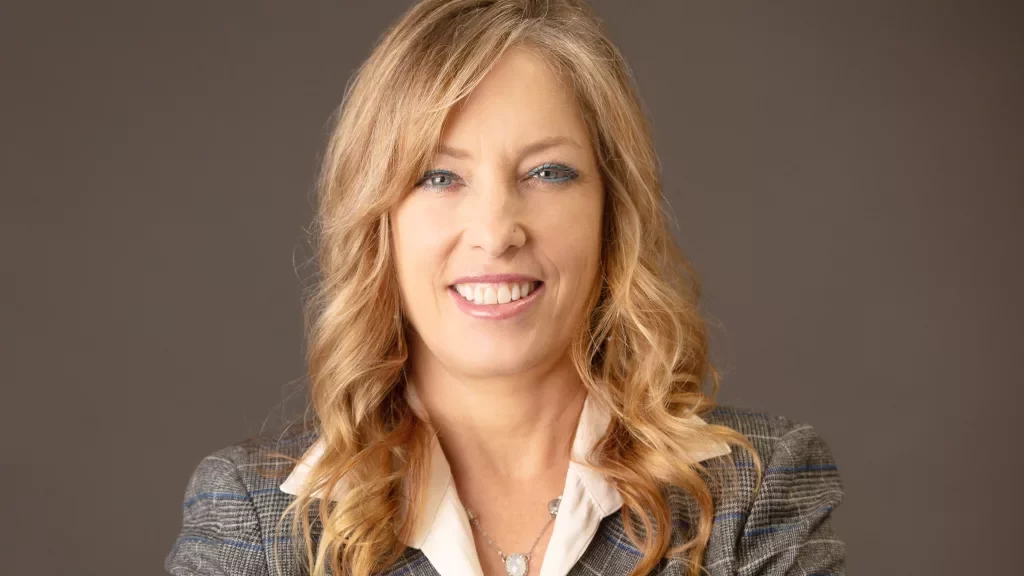
Michelle Enfield is a full-time student enrolled in the Peace and Conflict Studies bachelors program. Alongside her partner, she owns and operates a Martial Arts dojo and International karate organization. She has trained in karate in Okinawa and considers herself a lifelong student in both karate and kobudo (traditional weapons practice). She currently holds the title Renshi, fifth degree black belt in Okinawan Goju Ryu Karate-do.
Michelle Sensei’s infectious energy and attitude infuses students with personal power to inspire them to achieve the highest levels of physical and mental mastery. As a reflection of this, in 2019, she was nominated as Woman Martial Artist of the year by the British Martial Arts association. She was also awarded “Humanitarian of the Year” for 2019 by Hanshi Patrick McCarthy, and the International Ryukyu Karate-jutsu Research Society for her work in martial arts and the international community as a whole.
When not at the dojo, Michelle Sensei regularly gives educational talks; she is a Sexual Assault Response Team member, and licensed advocate against sexual assault and domestic violence for the state of California. She is involved with the non-profit women’s group, Soroptimist International at the local, regional, and international level and was selected as a delegate to the United Nations for the Commission of the Status of Women.
She went on to present the information she gleaned from her experience as a delegate to various civic organizations, raising awareness of issues and guiding her audiences as to how they can make a difference in these areas.
EMILY JANKE INTERVIEWS MICHELLE ENFIELD
EMILY JANKE (EJ):
What is something that is bringing you joy right now?
MICHELLE ENFIELD (ME):
All four of my kids were home at the same time for the holidays this year. It hasn’t happened for four years. They have been in med school, law school and building careers in engineering and social work…. So, finally we all got back together. I was so excited and grateful!
EJ:
How did you find out about the Peace and Conflict Studies program?
ME:
After being a delegate to the UN Commission on the Status of Women, I’ve witnessed some powerful women speakers who have dedicated their lives to human rights work and raising awareness of critical issues, from the grassroots level to the international landscape.
I was able to witness the incredible human rights work women are accomplishing and how much work there is still to be done, and I want to be part of it. The Commission on the Status of Women has sparked my interest in positive peace and how to build and sustain it in our communities.
During Covid, like many folks, our business was affected, international seminars were not an option. This brought light to the fact that we need a viable strategy for the next phase of life. After much reflection on reaching my full potential, I chose to go back to school. This connects directly with our martial arts philosophy of holding oneself to a high standard: we are students first, seeking self-improvement.
I began searching for online programs and much to my good fortune I found UNCG’s PCS program that was offered entirely online. I connected with an education counselor, and she assured me that the program was well priced, even for non-resident students, so I was all in. I have a deep passion for practicing and teaching Martial Arts, and for social justice, therefore, the PCS program at UNCG was the perfect fit.
I’m grateful that I have been able to pursue my passion for the martial arts in my career, and now, hopefully, I will be able to pursue a career in the field of another passion, social justice.
EJ:
What are some things you’ve learned?
ME:
This last semester I was exposed to conflict resolution theory, practice, and various forms of communication. I learned that it is vital for folks to be heard and understood, and that conflict often arises out of unmet needs and miscommunication. I have learned how to further my listening skills and to reflect back what I’m hearing, and how important that is.
I have learned about conflict styles and many techniques to be a more skillful communicator, both personally and professionally. I have also learned that conflict is not necessarily something negative or to be feared – that it can be a great source of growth and connection.
One of our assigned readings was Nonviolent Communication by Marshall Rosenberg. This material was enlightening for me, I added the audio book to my library, which I listen to on a regular basis, in an effort to assimilate the practice into my life. I learned many practical skills for facilitating meetings which will enhance our business, particularly the youth on our leadership team.
Youth are so incredibly important, and as instructors, I feel we have a responsibility to plant the seeds of self-confidence and resilience in our students. That one positive seed that we plant today, may grow on in students and expand out exponentially, impacting their future relationships. Our vision is to be a force for good in our community and our mission is to connect people with their personal power.
After this semester, I feel a sense of urgency to work with youth and empower them to not only develop a strong sense of self, but to teach them some of the communication and facilitation skills I have learned.
Additionally, as a coach, we are trained to demand things. This can carry over into one’s personal life.
This course of study has provoked me to question my habits and patterns. How can I change my approach to do better? What can I say differently in my personal relationships and with my students to tap into personal power and create deeper connections?
I sense young people have a keen interest in activism – a desire to make society more equitable, inclusive, particularly in regard to the mitigation of climate change. I hope to inspire our youth on their personal growth journey, and invoke a sense of civic responsibility that will inspire them to positively contribute to their communities, both local and global.
EJ:
Tell me about a meaningful experience since you’ve been in the program?
ME:
In the PCS 308 course, called “Managing Interpersonal Conflict,” I conducted an international story circle for my final praxis. The purpose was to inspire folks from various countries to probe for meaning, perspective change or personal growth they may have experienced in the midst of the pandemic. That story circle was deeply moving for all of us.
Although we live in different countries, the pandemic was handled in ways that will continue to impact us uniquely. Immediately following the circle, one of the participants created a final statement weaving together our final thoughts. When he shared it, we saw clearly our diverse and individual truths, when integrated in collaboration, created a deep collective wisdom that we all benefited from.
I will never forget what can be manifested by coming together and being vulnerable in a safe space. We are still connecting with, and supporting each other via our WhatsApp group, as we persevere through the continuing waves of Covid. It was a gift to be part of the story circle and connect at an intimate level. After this experience, I understand why story circles are sacred.
EJ:
What is a strength of the program?
ME:
Something that has impressed me, has been the emphasis placed on cultural competency – the awareness of race and being sensitive and aware of that component in our personal and professional lives.
This resonated with me, as growing up, race and racial justice issues were frequent conversations in our home. My family worked for the United Farm Workers of America, and some of my earliest memories are of participating in picket lines.
In every class I took this semester, special attention was given to cultural competency and the effect racism has had on Americans and our institutions. While I was raised in a working class, white family, race was really, really relevant for us.
It’s so inspiring to see that college students are getting this important education in their curriculum, and it is front and center in the higher education discourse. This is an inspiration that we as US citizens can, within our lifetime, potentially move the dial toward increased racial justice and equity in our own lives and in our communities.
EJ:
What would you share with a student considering the online degree?
ME:
Have confidence that you are not alone, your teachers will be there for you. All of the instructors have been available to me for one-on-one zoom meetings. This is a huge asset to online students – even though you are not attending class in person, you will have access and feedback from the instructors.
They are incredibly responsive, whether it’s via email or office hours. They are very interested in how they could supplement our learning or point us in the right direction if we had a question or concern. I found this to be true across the board with UNCG instructors, services, and my mentor.
